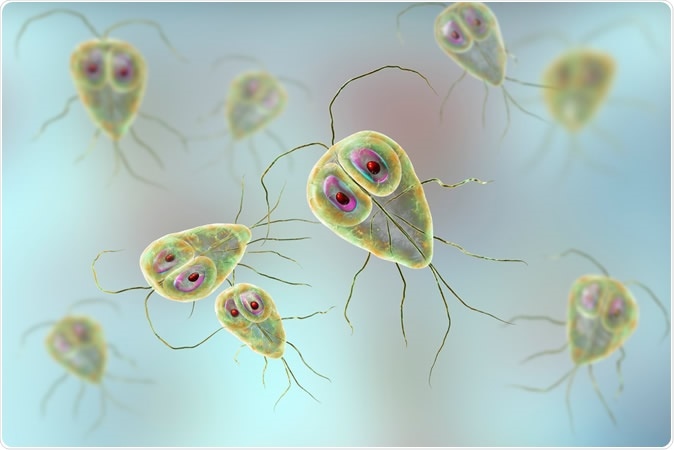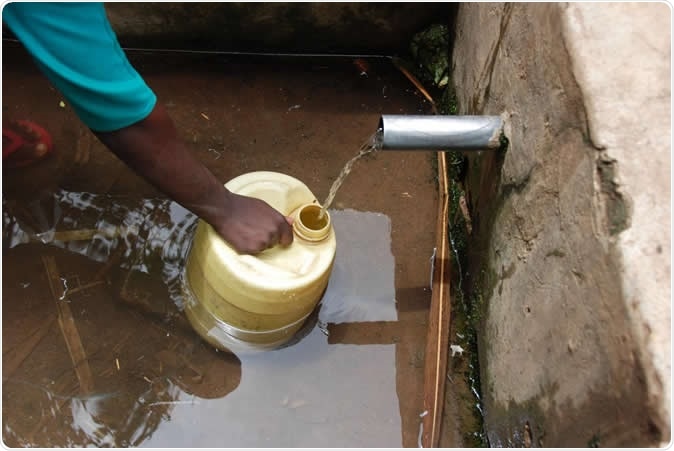Parasitic roundworm infections affect 800 million people across the globe, but thanks to water treatment, it can lead to a significant 18-percent decrease in cases.
A team of researchers at Tufts University wanted to know if improved water quality, handwashing, sanitation, and nutrition can combat the environmental transmission of parasites, but only a few trials have been conducted. Hence, they studied these factors in rural Kenya, wherein they determined the effects of the factors on the rates of the intestinal worm and Giardia infections.
They found that improving the quality of drinking water, through water treatments, can significantly reduce the rates of roundworm infections, particularly in high-risk regions. The study, which was published in the journal PLOS Medicine, reveals that water treatment alone has led to an 18-percent decrease in the rates of infection with roundworm or Ascaris. But, the reduction further went up to 22 percent when water treatment is partnered with handwashing with soap and improved sanitation.

Giardia lamblia protozoan, the causative agent of giardiasis, 3D illustration. Credit: Kateryna Kon / Shutterstock
Reduced parasite infections
To land to their findings, the researchers performed a randomized controlled trial among young children, to see if a single or combined intervention can reduce intestinal worm and Giardia infections. After two years of interventions, the researchers measured the prevalence of parasite infections in the area.
They found that water treatment alone, and even if combined with handwashing, integrated water, and handwashing, can sustainable decrease roundworm infections in children in Kenya. Children, especially, younger ones are at a higher risk of getting parasitic infections. However, the team found that nutrition did not improve the efficacy of the water, sanitation, and handwashing interventions.

Water sources may be a significant factor in the transmission of roundworm (usually via fecal contamination). Proper water treatment alone can reduce roundworm transmission by 18 percent. Credit: Amy Pickering, Tufts University
Improved water quality
The researchers pointed out that improvement in water quality, sanitation, and handwashing in homes and communities, can help protect children from Ascaris infections. The study also shows that water treatment alone can make a difference, especially in protecting children against the parasitic infection.
At present, water treatment has not been used as a strategy to control intestinal worm infections. Hence, the researchers wanted to recommend that more focus should be given to drinking water since it can be a mode of entry of parasitic worms.
They also said that instead of focusing on aggressive medical treatment programs, the sanitation, water treatment, and handwashing techniques can become sustainable methods for disease control. Also, these techniques are inexpensive and accessible, even in far-flung places.
"Out of all the interventions we tested, we were extremely surprised that water treatment appeared to be the most effective at reducing roundworm infections. Water treatment is a relatively unexplored strategy for intestinal worm control," Amy Pickering, assistant professor of civil and environmental engineering at Tufts University.
"At least 800 million people in the world are infected by roundworm (Ascaris lumbricoides), so even a relative reduction of 18 percent from water treatment interventions could have a major beneficial impact. Our study also suggests that water treatment could complement large-scale deworming medication delivery programs in the global effort to eliminate roundworm infections,” she added.
Intestinal worm and protozoan infections
Intestinal parasitic worms and protozoan infections affect more than 1 billion children across the globe. These infections may lead to severe complications, if they’re left untreated, including stunted growth and problems with cognitive development.
Usually, the parasites live in soil and contaminated drinking water and can be transmitted via the fecal-oral route. Ascariasis is a parasitic roundworm infection affecting the small intestine. Roundworms are parasitic worms that cause disease to thrive in unsanitized places. The infection is most common in places without modern sanitation.
Unsafe water and food are major culprits in parasitic roundworm infections. Infants and children are vulnerable to parasitic infections because they put their hands in their mouths, even after playing with contaminated soil. Ascariasis can also be passed from one person to another directly.
The Bill & Melinda Gates Foundation and USAID funded the study.
Journal reference:
Effects of single and integrated water, sanitation, handwashing, and nutrition interventions on child soil-transmitted helminth and Giardia infections: A cluster-randomized controlled trial in rural Kenya, Pickering AJ, Njenga SM, Steinbaum L, Swarthout J, Lin A, et al. (2019) Effects of single and integrated water, sanitation, handwashing, and nutrition interventions on child soil-transmitted helminth and Giardia infections: A cluster-randomized controlled trial in rural Kenya. PLOS Medicine 16(6): e1002841. https://doi.org/10.1371/journal.pmed.1002841, https://journals.plos.org/plosmedicine/article?id=10.1371/journal.pmed.1002841